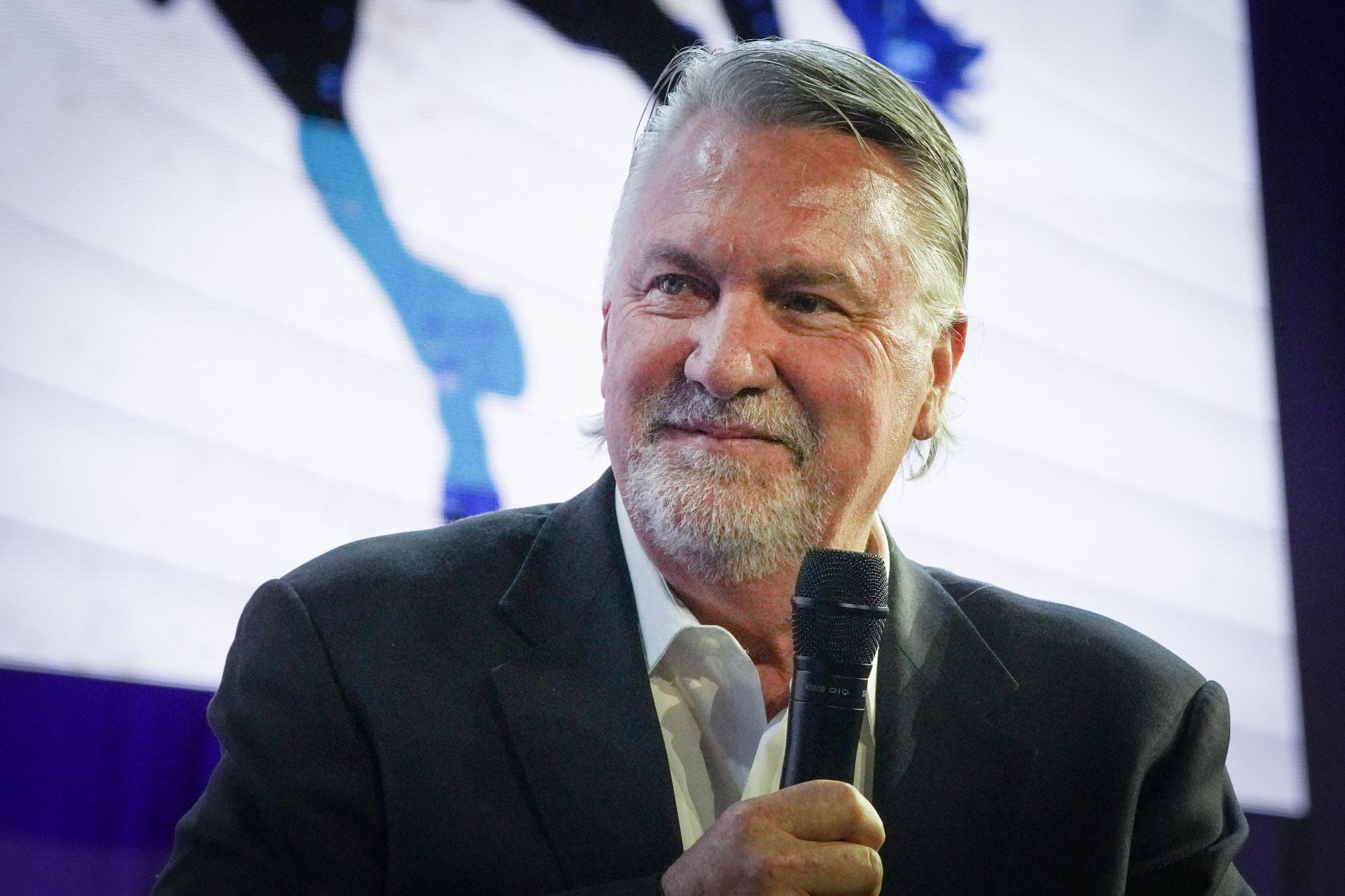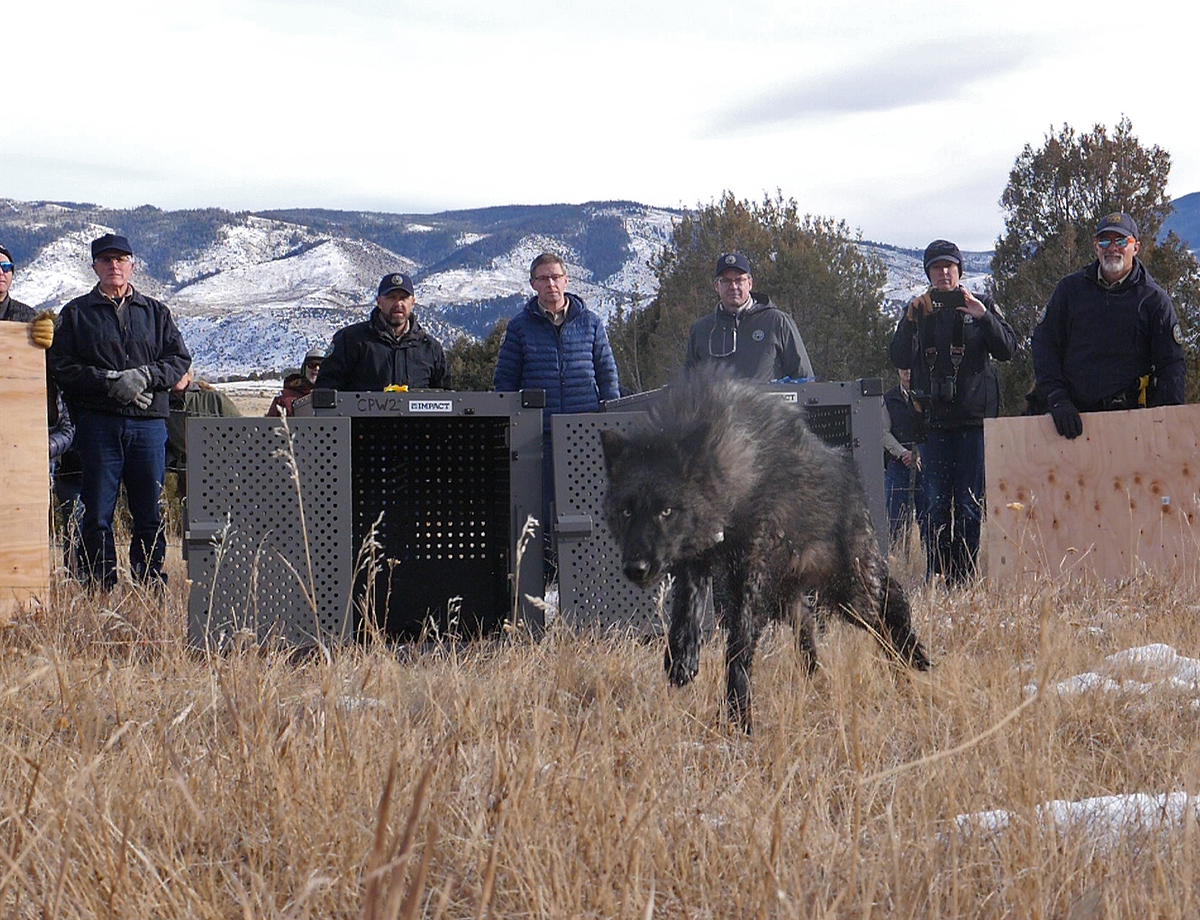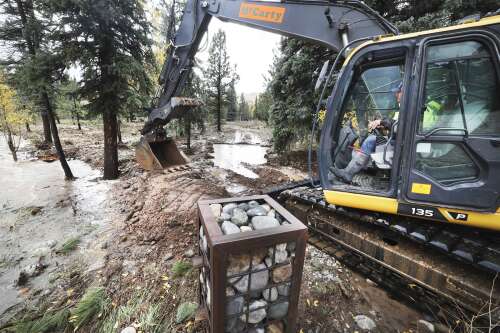
Republican businessman Joe O’Dea made his case for why he should replace incumbent Democrat Michael Bennet in the U.S. Senate.
In an interview with Colorado Matters, he criticized the recent Democrat-passed legislation, the Inflation Reduction Act. The act gives the IRS more money to hire additional personnel for tax law enforcement and creates a 15 percent corporate tax rate for companies making more than $1 billion in profit. Also included in the legislation are prescription drug caps for Medicare beneficiaries.
But O’Dea said the Inflation Reduction Act does nothing to actually lower inflation. The nonpartisan Congressional Budget Office backs up his claim — the CBO said the bill has a negligible effect on inflation both this year and the next.
O’Dea also takes contention with the hiring of new IRS agents, calling it a tax on middle class Americans. He said instead he would use the money going toward more agents and put it toward law enforcement, to stop the opioid and fentanyl crisis.
O’Dea criticized his opponent by saying Bennet should use his vote as a bargaining chip. He said Bennet should have held up legislation to force President Joe Biden to address moving Space Command from Colorado Springs to Huntsville, Alabama.
O'Dea is running against Democratic incumbent Michael Bennet.
This interview has been edited for length and clarity.
Chandra Thomas Whitfield: Joe O'Dea, welcome.
Joe O'Dea: Chandra, thanks for having me on today. Really appreciate it.
Thomas Whitfield: Congress recently passed the Inflation Reduction Act, which includes several provisions such as an investment in energy security and climate protection, prescription drug limits for Medicare beneficiaries, and giving the IRS more power to investigate tax fraud. You've said in the past that you would not have supported that bill because you disapprove of hiring more IRS agents. Does your disapproval outweigh the need to invest in climate protections or allowing the government to negotiate prescription drug prices for Medicare?
O'Dea: Well, there's a lot of individual things in this bill that may need to get addressed, but my basic premise with this bill is it's a tax. I was very vocal early on, if you listened to the Committee on Joint Taxation, which is a nonpartisan committee, they're saying that 75% of these audits are going to be performed on people making less than $100,000 a year. And that's the working Americans. That's small business owners, that's gig contractors, that's plumbers, that's going to be painters, that's going to be waiters and waitresses that they're going to shake down. And I don't believe that we need a tax going into a recession. They name the bill the Inflation Reduction Act, and Bernie Sanders has come out and said it's not going to do anything to raise or to lower inflation, Inflation Reduction Act. So I mean, they've named it something different than it really is.
Editor’s Note: Sanders has said this but argued that the IRA doesn't go far enough.
O'Dea: There's things in the bill that I can kind of get my head around, but we've got to make sure that we're able to get those clearly performed. You had talked earlier about the bill would lower the cost of some drugs. It gives Medicare, Medicaid the right to negotiate, but what that's going to do is transfer the cost of drugs onto working Americans that are paying their own insurance costs. That's who's going to end up picking up the amount of that. It doesn't go far enough. They should have done something with all drugs. Instead, they just limited to the Medicare, and so that's going to transfer the cost of those drugs onto working Americans. So that's why I have a real problem with the bill.
Thomas Whitfield: Now, would you say it's a tax or a tax enforcement?
O'Dea: I'd say it's a tax, and they're going to come after working Americans and collect money. That's what they're going to do. They talk about, some people have said 40,000, some have said 87,000 new IRS employees. They're going to grow another bureaucracy to shake down working Americans. And it's not just the upper 1%. If they were going to shake down the upper 1%, they would need 1,000 or 2,000 new agents. They're coming after working Americans.
Thomas Whitfield: Gas prices have been on an overall decline since peaking at an all time high of $4.90 per gallon in Colorado in June. Do you see the fall in prices as a sign that some democratic policies are working?
O'Dea: Absolutely not. It's just a supply and demand issue over the summer, less people driving this summer. We're starting to see it creep back up here in Colorado. It's gone to $3.75, $3.85 now. In the past seven days, it's gone up every day in Colorado. It's going to continue to increase. They've got new additives that are going to need to be put in place here in Colorado, that Governor Polis refused to prohibit. So we're going to see that increase another 30, 40, 50 cents in the next months. So I'll give him credit. It came down a little during the summer, but at the same time it's headed back up again.
Editor’s Note: According to AAA, a gallon of gas cost Coloradans $3.71 as of Thursday, down from $3.72 the day before. On September 22, it was $3.75. At the end of August, it cost $3.81. In August, the Denver Post reported the state will be required to use a reformulated gas that, according to AAA, will add 20 to 30 cents a gallon.
Thomas Whitfield: Now, isn't summer peak driving season though?
O'Dea: Well, not for a lot of average Americans this year. A lot of them [were] having to think twice with the inflation that they've put in place. People have made concessions. They're not traveling like they were here years ago. And it's because of this inflationary period of time that's been caused by the $1.9 trillion they dumped into the market here a year and a half ago in March with the rescue plan. That's caused wages, the earning power to go down by 10 percent on an average family here in Colorado. And they're feeling the pinch.
Editor’s Note: According to Bell Policy Center, people’s earning power has decreased about 5 percent across the state because of inflation in areas like housing, food and health care.
Thomas Whitfield: You've said previously on this show that the United States cannot completely give up fossil fuels because there isn't infrastructure in place yet for renewable energy. But some argue that if we don't start the transition now, we never will and time is running out. What's your response to that?
O'Dea: It makes absolutely no sense to me that we're going to not allow fossil fuels here in the United States, and at the very same time, we're going to contract with Venezuela, Iran, Russia to import those exact same products into the United States. That's not effective emissions reduction. It actually adds to it by having it being transported. We've got much better regulations here in the United States than they do overseas. So the oversight here actually would help to reduce emissions by allowing that to happen here. We've got to raise the boat on everything. We need good winds, solar, nuclear, geothermal. A good clean U.S. natural gas has done more to lower emissions in the United States than any of the wind and solar that's happened here in the last 10 years. So we need to embrace that technology and move our country forward. If we're going to grow the grid, it needs to be with all of the above. I think we should take a look at nuclear.
Editor’s Note: President Joe Biden signed an executive order in March banning Russian energy imports. A bill was signed in April to codify the ban on importing Russian energy. In 2018, former President Donald Trump withdrew from the Iran nuclear deal.
Thomas Whitfield: You've criticized the Biden administration's student loan forgiveness plan saying that canceling loans would penalize those who already paid, and you've asserted that canceling debt means those who didn't go to college are paying the debt of those who did. Some would argue that is also how public schools are funded and that those who don't have kids in public schools still pay taxes to educate the children of those who do. Is your argument fair?
O'Dea: I believe it is. When you talk to working Americans here in Colorado, they're upset about having to pay someone else's tuition. The difference is, they didn't sign up for that tuition. In a public school, you know exactly what you're getting into. And if you opt into a private school, that's at your [choice] and you continue to pay that bill. In this instance, we've got a bureaucracy that I don't even think it's legal for Biden to have done this; And they're imposing this tax, and it is a tax we're having to pay for it, it's a debt transfer onto working Americans that didn't sign up for that deal. They may have chosen to go through a trade school. They may not have gone to college. Or like a lot of us, we paid our own tuition by working. So this is a fairness issue. It's just not right. You shouldn't transfer someone else's debt that they signed up to to someone else.
Thomas Whitfield: Now, do you consider it not legal to have certain Americans paying off the student loan?
O'Dea: I don't believe that the president has the executive authority to make that decision. The purse belongs to Congress. If he's going to do it, he needs to run it by the people, that would be the Senate and the House, and they are the ones that control the purse here in the United States. Nancy Pelosi admitted that Biden didn't have that authority. We've heard that from her before, and she's right in this instance.
Thomas Whitfield: So do you think there's any role the government should play in student loan forgiveness at all?
O'Dea: I think we need to get at the crux of the problem. Tuition has become way too expensive for people. We've got a lot of these colleges sitting on billions and billions of dollars in their endowments. Why aren't they using those endowments to hold down the cost of education across the board? I'm also an advocate for trade schools. There's a lot of kids that, like myself, go through a trade school. You come out of that trade school after four years, and you're earning a living and you have no debt at all. So I'm an advocate for expanding that practice.
Thomas Whitfield: You've described yourself as an outsider, but the Colorado Democratic Party accuses you of hypocrisy when you attend fundraisers with lobbyists and congressional leaders like Mitch McConnell in Washington D.C., Georgia and elsewhere. How do you respond to that criticism?
O'Dea: It's just hypocritical. The Democratic Party has got an organization that funds their candidates from, in this case here, Michael Bennett's funding is coming from New York and California. I'm not doing anything any other candidate [wouldn’t] do, which is raising money so that we can keep our ads on TV. It's a little bit disingenuous to me. Michael Bennet has taking over a million dollars from lobbyists since he took office, and he's trying to hide behind the fact that he doesn't accept money from packs, but he'll accept it from a union. It's ridiculous. So it's just hide the football with him. He's trying to draw attention to my campaign. He's no different. And in fact, he's worse. He's taken money from a lot of people out of state.
Editor’s Note: Sen. Michael Bennet has received some funding from states like California, New York and elsewhere, but most of his funding comes from Colorado.
Thomas Whitfield: You've said in the past that you believe abortion should be legal up to 20 weeks. Senator Lindsey Graham introduced a bill that bans abortion federally after 15 weeks. And Colorado Republican Congress members Doug Lamborn, Ken Buck and Lauren Boebert have all signed onto the house version of the bill. Do you think they are too far right on this issue?
O'Dea: I don't believe that that bill has any chance of getting 60 signatures. One thing it doesn't do is protect a woman's right early on in the pregnancy. So it's no different than Schumer's bill, which would allow abortion all the way up to and including the day of birth. That bill never gets 60 signatures. I like where Senator Collins, Kaine, Sinema and Murkowski are; They've got a bill that's more reasonable that's more in line with what I've advocated for. It protects a woman's rights early on and then [has] exceptions for rape, incest and life of the mother, it protects from that point on. So I think that type of a bill has a chance of getting through the Senate, and that's something that I would get behind.
Editor’s note: The bill does not specifically allow abortion in late pregnancy, but it does not include language about restrictions. Instead, it leaves decisions up to patients and their doctor.
Thomas Whitfield: Now, if you're looking to flip the Senate, it very well might be able to get 60 signatures. What are your thoughts?
O'Dea: Well, I hope so. I think the American public is tired of batting this issue back and forth. When one party's in power, it goes one direction. When another party's in power, it goes another direction. I think people are ready for some balance to the abortion issue, and I think that it would be good to get this issue solved.
Thomas Whitfield: Now, do you feel like you may be out of touch with what GOP voters want on this issue given the support of the 15 weeks measure in Congress?
O'Dea: Look, I represent Colorado, and Colorado's made it very clear that they want balance to the abortion issue; They don't like the late-term at will. At the same time, they don't want [a total ban here] in Colorado. So there has to be some middle ground that people can find, that gets this issue taken care of so that we've got balances we work forward.
Thomas Whitfield: You've described yourself as a moderate Republican in this race. Is there a piece of legislation that passed in the past two years under the Biden administration that you would have voted for?
O'Dea: I was very vocal about the infrastructure bill that got passed, although there were a lot of things within that bill that I disagreed with. The majority of the bill was going to help our infrastructure. That's a bill that I would've signed with some of the other Republicans.
Thomas Whitfield: Would you have supported the bipartisan gun law that encouraged states to enact red flag laws and put federal money toward mental health?
O'Dea: Well, I didn't like that law. I don't believe we need more laws here in Colorado. We already have a red flag [law]. We didn't need it here.
Secondly, we're not enforcing the laws that we already have on the books here, in terms of gun control. We're allowing people that steal cars to possess a weapon without that being a felony, and we've really stretched the limits on guns here in Colorado. We haven't enforced our laws, so until we start enforcing the ones that are on the books, I don't see a point in adding more.
Thomas Whitfield: Is there any room in Colorado for changes in gun laws?
O'Dea: Well, the first change I'd make is let's enforce the ones that we have. We've got woke DAs here, both in Denver and throughout other areas in the state, that aren't enforcing the gun laws that we have. Felons should not be allowed to possess a gun. That was a law. It got changed here, I believe, four years ago [and] made it easier for a felon to possess a gun. Let's take that one on and start enforcing the laws that are on the books. We need more cops on our streets. I've been very vocal about more resources for our local police departments.
Thomas Whitfield: Now, in relation to that bipartisan gun legislation, what about the mental health funding that was in the bill protecting schools?
O'Dea: The problem with that is it's not new money. We need new money into mental health. It's probably one of the largest issues that we're going to have to tackle going forward. If you look at our homelessness situation here in Colorado and throughout the United States, a lot of those people are addicts, a lot of those people are alcoholics. They've got significant issues that we've got to get better resources around so we can get these people the compassionate help that they need, and I would be an advocate for spending money on mental health. I think that's really important as we move our country forward.
Whitfield: Now, you've said in the past that you want to limit government funding, but how does that square with the idea of expanding the police force?
O'Dea: One of the bills that I would run here this very next year when I'm elected as the next U.S. Senator from Colorado, would be to go after the Inflation Reduction Act, specifically growing the bureaucracy of the IRS. I would take that funding that's already approved and I would begin to use those funds to secure our border, put more border patrol down on the border.
I would also want to be inclusive of fixing our immigration system. We need to streamline the system. We need to make it easier to come to America the right way. And secondly, we need to include citizenship for the dreamers.
And the last piece of that bill, I would use the balance left after we get the border secure and more border security hired to help our local police departments. I'd use those funds to give them the resources that they need to begin recruiting and begin to put these departments back to the right size that they once were. I've talked to [Denver Police] Chief [Paul] Pazen. He's told me he needs 250 more police [officers] to fill his roles. I was with Sheriff [Jeff] Shrader yesterday from Jefferson County, driving around with him, and he made it very clear to me that he could use 50 more hands in his department. That's a significant issue for a department that's only 600. So we're talking about somewhere in the neighborhood of 10 percent more cops. That's what I think we should be doing with the money that got approved through that bill.
Thomas Whitfield: Most voters believe that the immigration system needs to be reformed, what systemic changes would you propose?
O'Dea: Well, first off, we've got to secure our border so that we know who's coming here legally. And then, we need to make it easier for those people that want to come and add to the immigrant levels here in the United States the right way. We need to make that easier. We need a process that's definable. It should have timeframes on it that are acceptable, but currently we have, my understanding is two and a half years, it's taking to get a hearing now if you're here the right way. So we've got to streamline that process to make it easier for good people to come here and add to our economy.
Thomas Whitfield: You've also said on this program before that fentanyl is another major concern when it comes to border security. With fentanyl overdose deaths reaching an all time high in Colorado, what do you propose to address that issue?
O'Dea: It's about securing the border, more border patrol: use the money from growing the IRS and then grow the cops here in Colorado. We need more local resources so that we can get control of this drug. When you talk to any of the cops that are up here, they're telling you they're doing everything they can. They've got NARCAN in all of their cruisers now, making sure that they can bring people back to life. But they can't control it up here, it needs to be controlled at our southern border. We need to kill the supply of fentanyl coming across there illegally.
Thomas Whitfield: Should you get elected, what would be your ideal committee assignments?
O'Dea: I'd like to be on committees that I think can help Colorado. I'd like to be on the energy committee, I'd like to be on the agricultural committee, or I'd certainly do something with the military. Over 8.5 percent of Colorado's GDP is made up from the military and those companies that work alongside our military: the five bases here. I think I'd like to do that for Colorado, wherever I can help.
Editor’s Note: Colorado is home to six military bases.
I've been disappointed in Senator Bennet. He hasn't used his chair to get really good things here in Colorado. Space Command comes to mind right out of the gate. Senator Bennet should step up and say, "President Biden, I'm not going to vote with you on this appointment, I'm not going to vote with you on this next bill until you give Colorado Space Command." That would be a win for Colorado.
Thomas Whitfield: Joe O'Dea, thank you.
O'Dea: Chandra, thanks for having me on today. I appreciate it and look forward to talking to you again.








